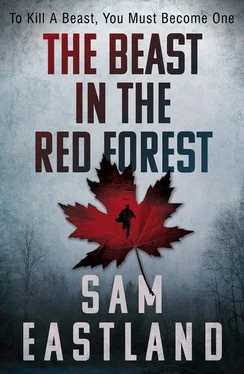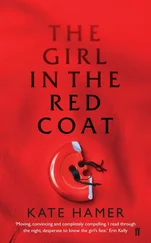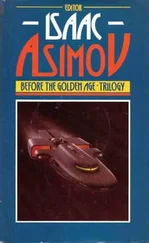Sam Eastland - The Beast in the Red Forest
Здесь есть возможность читать онлайн «Sam Eastland - The Beast in the Red Forest» весь текст электронной книги совершенно бесплатно (целиком полную версию без сокращений). В некоторых случаях можно слушать аудио, скачать через торрент в формате fb2 и присутствует краткое содержание. Год выпуска: 2013, ISBN: 2013, Издательство: Faber & Faber, Жанр: Исторический детектив, на английском языке. Описание произведения, (предисловие) а так же отзывы посетителей доступны на портале библиотеки ЛибКат.
- Название:The Beast in the Red Forest
- Автор:
- Издательство:Faber & Faber
- Жанр:
- Год:2013
- ISBN:9780571281466
- Рейтинг книги:4 / 5. Голосов: 1
-
Избранное:Добавить в избранное
- Отзывы:
-
Ваша оценка:
- 80
- 1
- 2
- 3
- 4
- 5
The Beast in the Red Forest: краткое содержание, описание и аннотация
Предлагаем к чтению аннотацию, описание, краткое содержание или предисловие (зависит от того, что написал сам автор книги «The Beast in the Red Forest»). Если вы не нашли необходимую информацию о книге — напишите в комментариях, мы постараемся отыскать её.
The Beast in the Red Forest — читать онлайн бесплатно полную книгу (весь текст) целиком
Ниже представлен текст книги, разбитый по страницам. Система сохранения места последней прочитанной страницы, позволяет с удобством читать онлайн бесплатно книгу «The Beast in the Red Forest», без необходимости каждый раз заново искать на чём Вы остановились. Поставьте закладку, и сможете в любой момент перейти на страницу, на которой закончили чтение.
Интервал:
Закладка:
Having finished this frantic ritual, Kirov fished out a box of matches and lit the lantern. It was only then that he realised there were two men sitting at the table, both watching him intently.
One of them was Pekkala.
The other, Kirov had never seen before. With rags for clothes offset by an oddly dignified pair of gold-rimmed spectacles, he looked like a shipwrecked millionaire.
‘This is Major Kirov,’ said Pekkala.
‘And I,’ said the stranger, ‘am Andrei Barabanschikov. So, Commissar, you are here to help us catch a killer.’
‘That’s right,’ replied Kirov.
‘It seems to me that you need look no further than the ranks of your own people.’
Kirov bristled at the remark. ‘Why would you say that?’
‘From what I hear, the man who killed Andrich and those partisans was wearing a Red Army uniform.’
‘It was probably stolen.’
‘Perhaps,’ admitted Barabanschikov, ‘but then there is the matter of your survival,’ said Barabanschikov. ‘Doesn’t it strike you as unusual? The only person I can think of who might hesitate to kill a Russian commissar,’ he paused, ‘is another commissar.’
‘I did not come here to solve your murders, Comrade Barabanschikov, or to become one of your victims, either,’ Kirov pointed at the tear in his tunic where the bullet had gone in. ‘As far as I’m concerned, if Stalin has given the order to lay down your weapons, then that is exactly what you should do. This is simply a choice between life and death.’
‘Enough!’ shouted Pekkala. ‘If even you two can’t see eye to eye, then what hope is there of peace?’
‘But we do agree,’ insisted Barabanschikov. ‘About one thing, at least. The major is correct that this is indeed a choice between life and death. But what he does not seem to understand is that the choice is ours to make, not theirs.’
Their conversation was interrupted by the sound of a heavy diesel engine and a squeak of brakes in the alleyway behind the house.
‘They’re here,’ announced Barabanschikov.
‘Major Kirov,’ said Pekkala as he rose from his chair, ‘I would like for you to meet some friends of mine.’
Parked in the alley was a German military Hanomag truck, with SS number plates and a black and white Maltese cross painted upon each door of the driver’s cab. Its windscreen had been cracked into a spray of the silver lightning bolts, still tinted with the blood of the driver whose head had collided with the glass when an ambush ran it off the road the week before.
Crowded into the back were the truck’s new owners: an assortment of heavily armed men, most of them bearded, their hair long and unkempt. They were armed with weapons of all types — German Mausers, Russian Mosin-Nagants and Austrian Steyr-Mannlichers. Others had no guns at all, but carried butcher’s knives, sledgehammers and hatchets. Their clothing was equally varied. One had crammed himself into the silver-buttoned tunic of a Ukrainian Nationalist policeman, the black cloth gashed across the back where its former occupant had been hewn down with the same axe carried by the man who wore it now. Others were swathed in the dappled camouflage smocks of Waffen SS soldiers, or the deer-brown wool of greatcoats scavenged from the graves of Polish soldiers. They wore bullet-punctured helmets, cloth caps snatched from the heads of men as they begged for their lives or braided garlands of twigs which they carried on their heads like crowns of thorns. One was barely in his teens, a gymnastiorka tunic hanging scarecrow-like from narrow shoulders and a sub-machine gun monstrous-looking in his arms. Beside him stood an older man, his face pockmarked and ears so whittled down by frostbite they looked as if they had been chewed by a dog. This man carried no weapon at all, but only a stick carved from white birch. There was no glint of kindness in their eyes, nor of any emotion that could have brought about a moment’s hesitation in the furtherance of butchery.
Like miners emerging from a tunnel deep beneath the ground, Pekkala and Barabanschikov blinked in the glare of sunlight.
Catching sight of Pekkala and their leader, the partisans raised their grizzled paws at them and bared their teeth in smiles, but they regarded Kirov, and the red stars on his sleeves, with undisguised contempt.
The bullet-riddled door opened on the driver’s side. A man in a black leather coat got out and approached Barabanschikov. The driver was short and barrel-chested, his broad face scalpeled with pale creases in the smoke-stained skin.
After exchanging a few words, Barabanschikov turned to Kirov and Pekkala. His face was grim. ‘There’s been another killing,’ he said.
‘Who is it?’ asked Pekkala.
‘Yakushkin, Commander of the Red Army garrison. My men have just found his body. You’d better come quickly.’
Without another word, they all climbed into the back of the truck. Crammed among the partisans, they sped away down the street, careening around piles of bricks, the husks of burnt-out vehicles and the carcasses of horses, still fastened to the traces of wagons they’d been pulling when they died.
Memo: Office of Comrade Stalin, Kremlin, to Third Western Division of Foreign Affairs. December 12th, 1937
You are instructed to prepare documents of voluntary transfer of citizenship from the United States of America to citizenship of the Soviet Union for William H. Vasko. You are authorised to backdate documents to September 1st, 1936. Work is to be carried out immediately by order of Comrade Stalin.
Signed — Poskrebychev, secretary to Comrade Stalin
*
From the office of Joseph Stalin, Kremlin
To Ambassador Joseph Davies, US Embassy, Mokhovaya Street. December 16th, 1937
Ambassador -
On behalf of Comrade Stalin, I am replying to your request for information on the arrest of American citizen William H. Vasko. We regret to inform you that no such American citizen has been arrested. However, the Central Records Office of the 3rd Western Division of Soviet Foreign Affairs indicates that, on September 1st, 1936, a William Vasko voluntarily transferred citizenship from the United States to the Soviet Union. This transfer is a matter of public record and can be accessed through the Central Records Office at any time. As such, if the arrest of Comrade Vasko had, in fact, taken place, it would be a matter for Soviet Internal Security and not for the United States Embassy. However, I have been authorised to inform you that Comrade Vasko is not currently under arrest or in detention at any Soviet facility.
Comrade Stalin expresses his hope that your inquiry into this matter has been resolved and hopes that, in future, your embassy staff will conduct a more thorough investigation into such matters before referring them to the Kremlin.
Signed — Poskrebychev, secretary to Comrade Stalin
The night before, while Kirov and Pekkala made their way towards the safe house, Fyodor Yakushkin, commander of the SMERSH Brigade, had been waiting for his dinner in a dilapidated apartment near the hospital.
A smell of cooking filled the room.
Perched on a chair which was too small for him, Yakushkin rested his fists upon a table set for two. He was a heavy-set man with a bald head and fleshy lips set into a thick, square jaw. Since his belly was too large for him to wear his gun belt comfortably while sitting, he had taken it off and hung it over the back of his chair. Out of habit, he removed his pistol from its holster and laid it within reach on the table. Then he sighed impatiently as he looked around at the blue sponge-printed flower pattern dabbed on to the butter-yellow wall, the delicate curtains and the framed pictures of a squinting, shifty-looking old man and an equally pugnacious old woman in a head scarf. Their stares made him uneasy. Adding to his discomfort was the fact everything around him looked breakable, as if all he had to do was touch the pictures or the curtains and they would come crashing to the floor. This impression of flimsiness included the chair on which he sat. He was afraid even to lean back, in case it collapsed underneath him.
Читать дальшеИнтервал:
Закладка:
Похожие книги на «The Beast in the Red Forest»
Представляем Вашему вниманию похожие книги на «The Beast in the Red Forest» списком для выбора. Мы отобрали схожую по названию и смыслу литературу в надежде предоставить читателям больше вариантов отыскать новые, интересные, ещё непрочитанные произведения.
Обсуждение, отзывы о книге «The Beast in the Red Forest» и просто собственные мнения читателей. Оставьте ваши комментарии, напишите, что Вы думаете о произведении, его смысле или главных героях. Укажите что конкретно понравилось, а что нет, и почему Вы так считаете.











